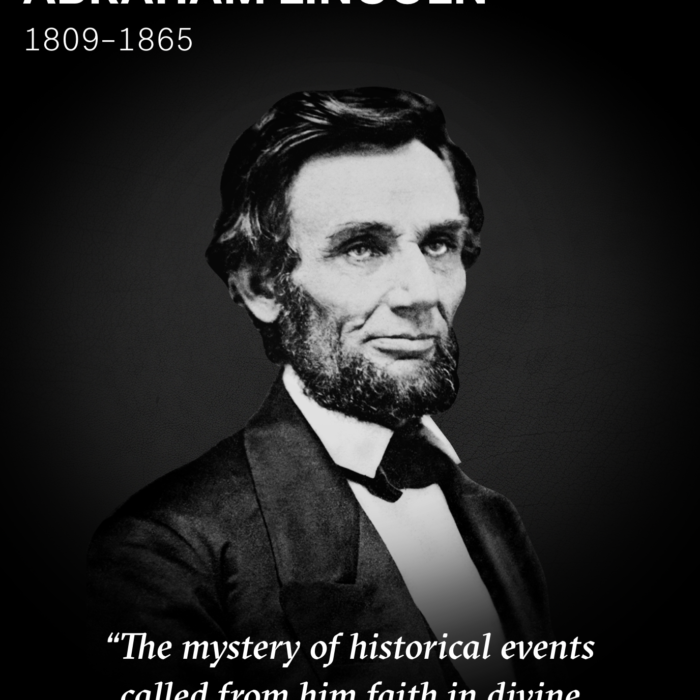
Dates: 1809–1865 [11]
Quote: The mystery of historical events called from him faith in divine superintendence. … Lincoln’s pass through the furnace left him at the end wanting more, not less, to believe.
Quote credit: Allen C. Guelzo, historian and biographer, 1999
Image credit: Library of Congress
Inspired by Faith
Synopsis copy: Abraham Lincoln led a deeply divided nation through the Civil War as the 16th President of the United States. Morally opposed to slavery, he worked to emancipate enslaved Americans and affirm their full citizenship.
Image credit: Library of Congress
A Life of Faith
Body copy: Lincoln often referenced the Bible in his call for national unity and his case against slavery. His political speeches are among the most religious in rhetoric, tone, and theological ideas of any American president. [310]
Date: Feb. 12, 1809
Title: Born near Hodgenville, Kentucky
Description: Lincoln was born in a log cabin on a farm in the slave state of Kentucky. His parents were Baptists. Largely self-taught, Lincoln read the Bible, John Bunyan’s Pilgrim’s Progress, Shakespeare, and historical works. His father opposed slavery on religious grounds, possibly influencing his son on the matter.
Image caption: Drawing of Lincoln’s log cabin birthplace, ca. 1865
Image credit: Kean Collection/Getty Images
Date: 1858
Title: Lincoln-Douglas Debates
Description: In Lincoln’s U.S. Senate campaign against Stephen Douglas, he delivered his “House Divided” speech. The idea of “a house divided against itself” (Matthew 12:25) warns that a government divided on the subject of slavery could not endure. Lincoln lost the election but won the Presidency in 1860.
Image caption: Lincoln speaking during one of the Lincoln-Douglas debates, September 18, 1858
Image credit: Universal History Archive / Universal Images Group via Getty Images
Date: March 4, 1861
Title: Inaugurated as President
Description: When Lincoln assumed leadership of a divided nation, his inaugural address emphasized the unitive value of faith, stating “Intelligence, patriotism, Christianity, and a firm reliance on Him who has never yet forsaken this favored land are still competent to adjust in the best way all our present difficulty.”
Image caption: Political cartoon illustrating the divided state of the nation leading up to the 1860 Presidential election, 1860
Image credit: Library of Congress
Date: April 12, 1861
Title: Civil War Begins
Description: Despite calls for unity, civil war broke out at Fort Sumter, in South Carolina. The war lasted four long years, and by the conflict’s end, there were upwards of 750,000 military and civilian deaths that tormented Lincoln’s soul.
Image caption: President Lincoln on Antietam Battlefield in Maryland during the Civil War, October, 1862
Image credit: National Archives and Records Administration
Date: Jan. 1, 1863
Title: Emancipation Proclamation
Description: Lincoln’s Emancipation Proclamation freed enslaved people living in the Confederate states, stating “that all persons held as slaves” within the rebellious states “are, and henceforward shall be free.” Full abolition was achieved in the 13th Amendment in 1865, which Lincoln strongly supported.
Image caption: Print of the Emancipation Proclamation, 1864
Image credit: Library of Congress Prints and Photographs Division
Date: March 4, 1865
Title: Delivers Second Inaugural Address
Description: As the war drew to a close, Lincoln reflected on its meaning in his seven-minute speech. He used biblical allusions to explore themes of sin, sacrifice, forgiveness, and redemption in arguably the most theological of Presidential speeches and referenced passages like Matthew 7:1 and 18:7 and Psalm 19:9.
Image caption: Lincoln delivering his Second Inaugural Address, March 4, 1865
Image credit: Library of Congress Prints and Photographs Division
Date: April 15, 1865
Title: Assassinated by John Wilkes Booth
Description: Murdered on Good Friday, Lincoln has been described as the “Redeemer President,” a martyr to and savior of the causes of union and democracy.
Image caption: Lithograph portraying Lincoln being carried up to heaven as an American civic martyr, ca. 1865
Image credit: Smithsonian American Art Museum
Second Inaugural Address
Bubble copy: Lincoln’s Second Inaugural Address, delivered on March 4, 1865, explores the mystery of God’s judgment against the sin of slavery. He calls for healing and hope for a “just and lasting peace among ourselves and with all nations.”
Image credit: Library of Congress, Manuscript Division, Abraham Lincoln Papers
Bubble copy: Both read the same Bible, and pray to the same God; and each invokes His aid against the other. It may seem strange … but let us judge not, that we be not judged. The prayers of both could not be answered; that of neither has been answered fully. [249]
Source: N/A
Image credit: Library of Congress, Manuscript Division, Abraham Lincoln Papers
Bubble copy: The Almighty has His own purposes. “Woe unto the world because of offences!” [Matthew 18:7] … He gives to both North and South, this terrible war, as the woe due to those by whom the offence came.
Source: N/A
Image credit: Library of Congress, Manuscript Division, Abraham Lincoln Papers
Bubble copy: Fondly do we hope—fervently do we pray—that this mighty scourge of war may speedily pass away. Yet, if God wills that it continue … so still it must be said “the judgments of the Lord, are true and righteous altogether.”
Source: N/A
Image credit: Library of Congress, Manuscript Division, Abraham Lincoln Papers
Bubble copy: With malice toward none, with charity for all, with firmness in the right as God gives us to see the right, let us strive on to finish the work we are in, to bind up the nation’s wounds.
Source: N/A
Image credit: Library of Congress, Manuscript Division, Abraham Lincoln Papers
Legacy of Liberty
Question/alignment statement: Do you think that biblical rhetoric and style are appropriate and inspirational in Presidential speech-making?
Image credit: AJSH Photography / Alamy Stock Photo
Scripture: The judgments of the Lord are true and righteous altogether.
Scripture credit: Psalm 19:9b
Image credit: Library of Congress Prints and Photographs Division
Related changemakers: Frederick Douglass, Martin Luther King, Jr., and William Jennings Bryan